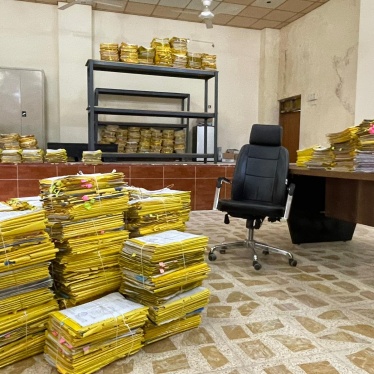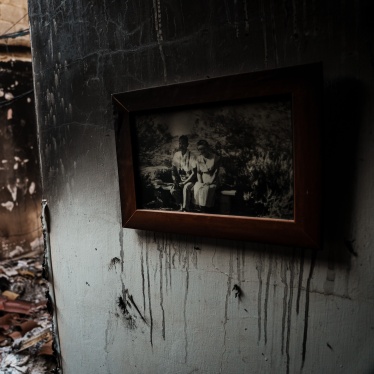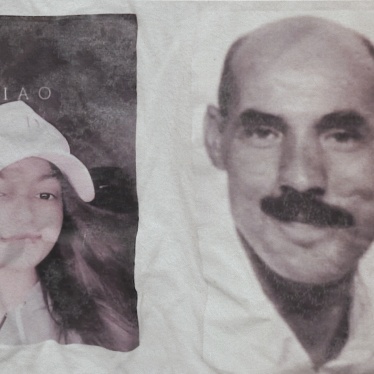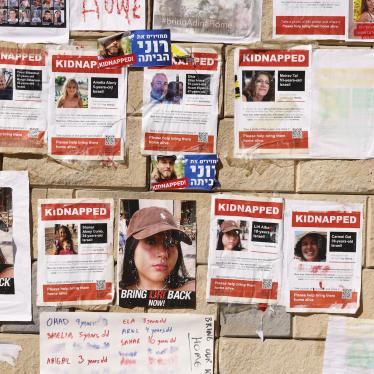Judge Ratib al-Wazani
Head of the Council of the Judiciary
Amman – Hashemite Kingdom of Jordan
Your Honor,
Human Rights Watch writes to draw your attention to a recent case related to terrorism in which the State Security Court’s judges used vague and overbroad elements of article 118 in the penal code to convict four defendants.
We ask that you consider issuing guidance to judges not to use these overbroad elements in the future, as they do not constitute a sufficiently cognizable offense and thus violate the principle in international law that criminal law must be sufficiently precise for a person to be able to reasonably foresee that his or her actions constitute a crime.
We believe that these elements of article 118 also violate the right to freedom of expression.
Recent proposed amendments to the constitution, issued by the Royal Committee for Revising the Constitution, which the parliament has yet to approve, urged the State Security Court’s jurisdiction to be restricted to high treason, espionage, and terrorism, none of which the elements of article 118 under consideration relate to. The constitutional proposals would also expressly affirm the independence of the Jordanian judiciary, something that the State Security Court’s mixed civilian and military system of judges appointed by the executive undermines.
Guidance that the Supreme Judicial Council should consider issuing to restrict use of overbroad and vague elements of article 118 of the penal code that are susceptible to political interpretations thus presents a timely opportunity to assert the independence of the judiciary.
In the case under consideration, on July 28, 2011, State Security Court judges Ibrahim Abu Qa’ud, a military judge, Dr. Muhammad al-‘Afif, also a military judge, and Ahmad al-Qatarina, a civilian judge, found ‘Isam Barqawi, Dr. Iyad Qunaibi, Aiman Abu al-Rabb, and Baha’ al-Din ‘Allan guilty under penal code article 118/2 of “conducting acts which the government has not permitted that are of such nature as to expose the kingdom to the danger of hostile acts and to disturb its relations with a foreign state.”
As the details of this case show, the State Security Court sentenced four persons under article 118/2 for speech critical of foreign governments and societies that international human rights law protects.
In their statements to the prosecutor, the defendants did not contest the facts of the case: that Qunaibi gave Barqawi 850 dinars on two occasions for the purpose of transmittal to the Taliban in Afghanistan; that Barqawi received monies from non-Jordanians for the same purpose; that Barqawi tried to recruit Abu al-Rabb who expressed a willingness to join the Taliban in Afghanistan and gave him Qunaibi’s money to deliver it to them; that Barqawi promised ‘Allan to help two other Jordanians abroad join the Taliban there; that Barqawi published a book as well as fatwas and other writings on the Internet that criticized Saudi society and the Tunisian constitution and elections.
The court found Barqawi guilty of a second charge of “recruiting persons within the kingdom for the purpose of joining terrorist organizations” under article 118/3 of the penal code. The court acquitted Abu al-Rabb of a third charge of “trying to leave the country for the purpose of joining armed groups or terrorist organizations,” also covered by article 118/3 of the penal code.
The court acquitted all of the accused of a fourth charge of “gathering money for a terrorist organization or group with the purpose of using it for terrorist acts,” under article 24a/3 and article 3/b of the Law to Combat Money Laundering and Financing Terrorism.
In its explanation of the law it applied to the facts, the court emphasized that for acts to constitute an offense under article 118/2 they do not need to actually result in “hostile acts” or “disturb[ed] relations with a foreign state,” but that the “probability” of such consequences suffices.
In further explanations that expose how the vague and overbroad elements of article 118 can be open to political interpretations that violate the right to freedom of expression, the court went on to say that Barqawi’s book criticizing Saudi society had led to expressions of “indignation” on a Saudi television show. The court then stated that for “a Jordanian citizen to publish [criticisms of Saudi society and the Tunisian elections and constitution] interferes in the affairs of those states and it is well-known that interference in internal affairs by a foreign citizen causes the government of any state indignation. This is a matter that may also influence the Jordanian community present in Saudi and Tunis [and lead to] acts against them, such as throwing them out or arresting them or stripping them of their financial interests.”
Your honor, these State Security Court’s explanations demonstrate the reasons for Human Rights Watch’s concern about the overbroad and vague nature of article 118/2. Every person has a right to make public criticisms, including of foreign societies and states.
Jordan is a party to the International Covenant on Civil and Political Rights (ICCPR), article 19 of which guarantees every person the right to freedom of expression “regardless of frontiers.” The Arab Charter for Human Rights, to which Jordan is also a state party, reiterates this right in article 32. Any restrictions on this right in order to protect the reputation of others or for reasons of national security must be according to law, must be necessary, and narrowly tailored for their stated purpose. “[D]isturb[ing Jordan’s] relations with a foreign state” would not constitute a legitimate basis for restricting the right to freedom of expression.
In early August 2011, the UN Human Rights Committee, which issues authoritative guidance on interpreting the ICCPR issued a new General Comment on article 19. “The mere fact that forms of expression are considered to be insulting to a public figure is not sufficient to justify the imposition of penalties,” the committee wrote, urging the “decriminalization of defamation.” The committee found that “in any case, the application of the criminal law should only be countenanced in the most serious of cases [of dangerous speech] and imprisonment is never an appropriate penalty.”
For these reasons, Human Rights Watch urges you to instruct judges not to apply article 118/2 of the penal code until the government and parliament have the opportunity to amend this article which as it stands lacks precision and criminalizes legitimate speech.
We thank you for your attention to this matter.
Sincerely,
Sarah Leah Whitson
Executive Director
Middle East and North Africa Division





